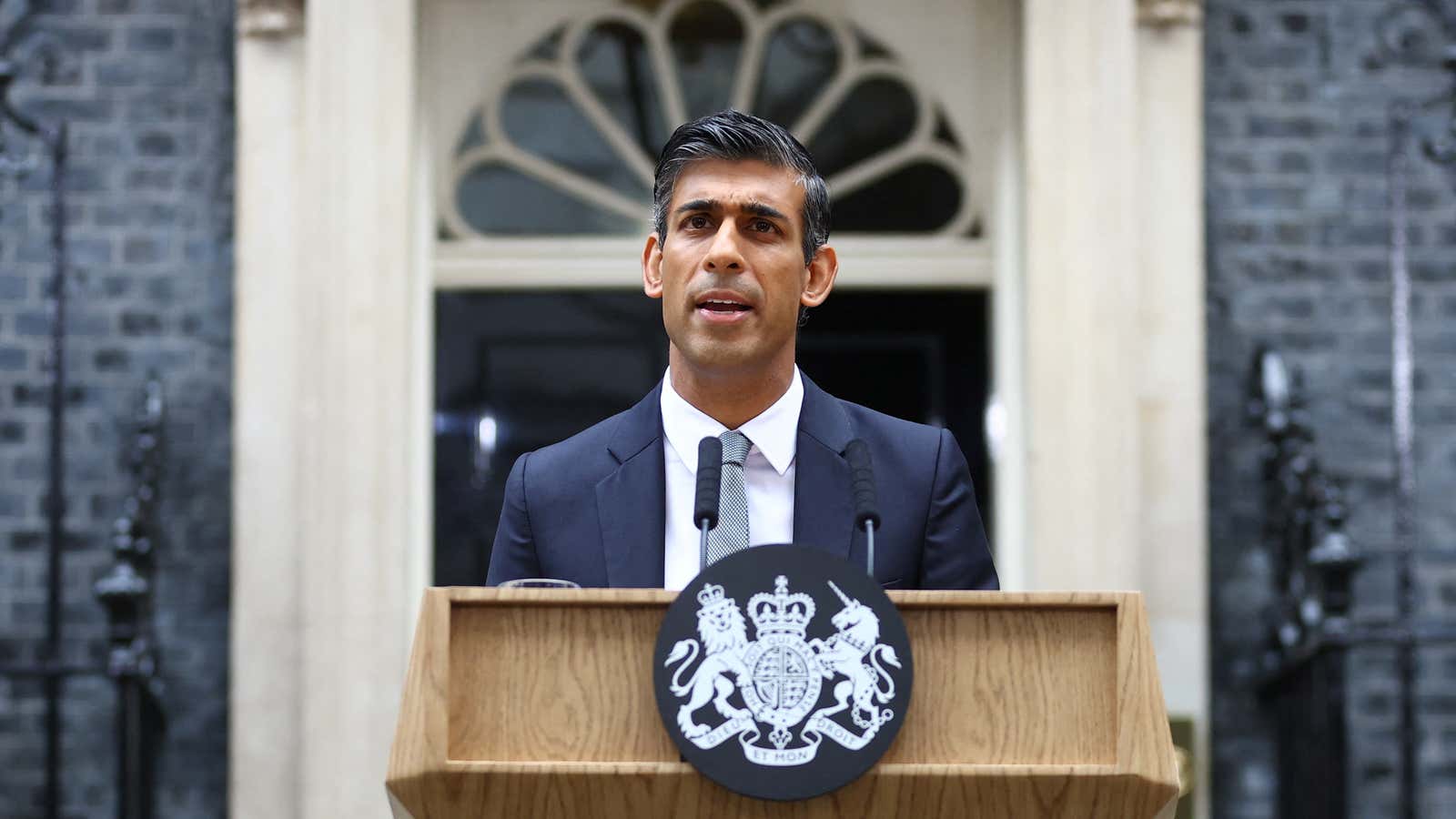Rishi Sunak’s first speech as prime minister was light on details and heavy on rhetoric. One clear priority that emerged was the need to lead the UK through a “profound economic crisis.”
Conservative party leader Sunak, who had lost out for the role to Liz Truss just a few weeks ago, said today (Oct. 25) he will place “economic stability and confidence” at the heart of his government.
The newest resident of 10, Downing Street–the third in just 7 weeks—made great use of the passive voice in referring to his predecessors’ mishaps and vowed to rectify them. In her parting words however, Truss made no reference to any mistake and doubled down on the need “to be bold” and for “lower taxes.”
What Rishi Sunak said about Truss’s mistakes
“I want to pay tribute to my predecessor Liz Truss, she was not wrong to want to improve growth in this country, it is a noble aim. And I admired her restlessness to create change. But some mistakes were made. Not borne of ill will or bad intentions. Quite the opposite, in fact. But mistakes nonetheless. And I have been elected as leader of my party, and your Prime Minister, in part, to fix them. And that work begins immediately.” —UK prime minister Rishi Sunak
Sunak’s cabinet reshuffle highlights
In his speech, Sunak promised the administration will have “integrity, professionalism, and accountability at every level.” In picking his cabinet, Sunak rewarded some of his closest allies, but he also kept in place a number of key appointments made by his predecessor.
💷 All eyes were on Sunak’s pick for chancellor of the exchequer. As expected, Sunak kept Jeremy Hunt, who was appointed less than 10 days ago to replace Kwasi Kwarteng, in the post. Hunt announced on Oct. 26 that the budget planned for Monday is now being postponed to Nov. 17.
🌊 Alok Sharma retains his role as COP26 president and will attend COP27 as a UK negotiator, but he will no longer attend cabinet.
🚔 The biggest surprise perhaps was at the Home Office, which sees the return of Suella Braverman, who was ousted by Truss over an email security breach last week. Her now temporary replacement, Grant Shapps, will now oversee the business, energy, and industrial strategy department.
UK cabinet ministers list*
*roles confirmed at time of publishing
A renewed focus on the 2019 Tory manifesto
In his speech, Sunak hinted that a general election is not on the table, saying he intends to deliver on the 2019 party manifesto, including creating a stronger National Health Service (NHS), better schools, safer streets, environmental protections, and more jobs, among other things.
During his leadership bid against Truss, he said he’d help the NHS combat its record backlog through missing appointment fines, new surgical hubs, and scaling up diagnostic centers. Sunak is also seen as a tech evangelist who supports startups and is “good for crypto.” Back when he was chancellor, he made some green moves but largely appeared to be a fence-sitter on climate.
However, he did not explicitly expand on how he intends to deliver on the manifesto today. He also avoided commenting on Truss’s controversial decision to lift a moratorium on fracking—a broken manifesto promise.
From finance minister to prime minister
UK markets rallied and the sterling recovered slightly on the news of Sunak’s appointment. Evidently, there’s a feeling the 42-year-old Stanford alum and former Goldman Sachs analyst is a safer pair of hands than his predecessor.
The lockdown skeptic who puts business needs front-and-center, Sunak had been a critic of Truss’s plan to simultaneously dole out energy subsidies and tax cuts. To avert the cost-of-living crisis, he proposed targeted help to people with lower incomes.
The new PM harked back to his time on the Johnson government—which he eventually resigned from because of his approach being “fundamentally too different” to Johnson’s—to boost his credentials.
“You saw me during Covid, doing everything I could, to protect people and businesses, with schemes like furlough,” he said. He did not mention one of his other key policies, Eat Out to Help Out, which partly subsidized people’s meals to support hospitality businesses as they cautiously reopened after the first covid lockdown was lifted—the policy was forecast to cost £500 million, but £840 million ($950 million) ended up being dished out.
Related stories
🤑 Rishi Sunak and his wife are richer than King Charles
👋 Liz Truss has resigned after 44 days in power that plunged the UK into chaos
📜 Why the UK can’t easily call a general election to replace Liz Truss
This story was updated with the Oct. 26 announcement of the fiscal statement’s postponement to from Oct. 31 to Nov. 17.
